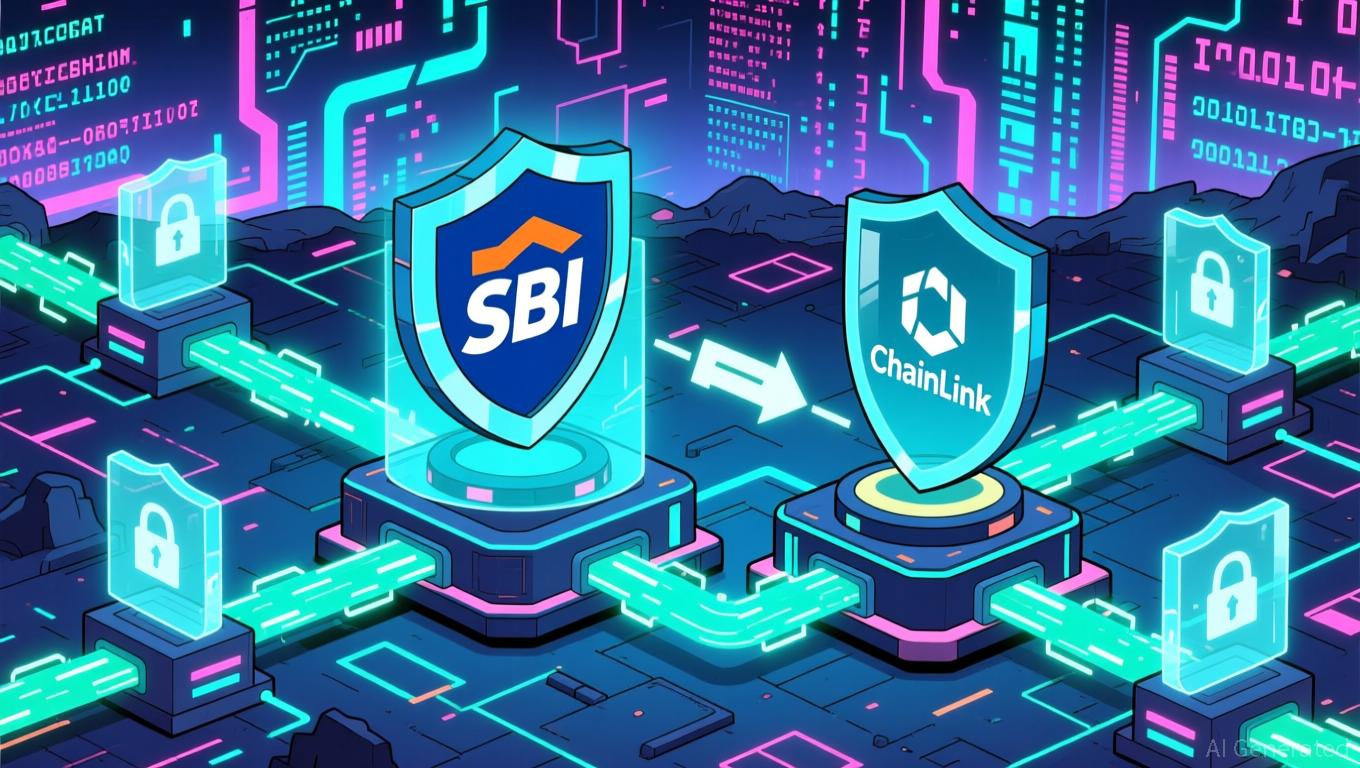SBI and Chainlink Connect Traditional Finance and DeFi Through Secure Tokenized Compliance
- SBI Digital Markets adopts Chainlink CCIP to secure cross-chain transfers of tokenized assets like securities and real-world assets. - Integration uses CCIP's private transactions and ACE compliance engine to protect sensitive data while aligning with global regulations. - The partnership bridges TradFi and DeFi by enabling instant settlements and reducing cross-border transfer costs, supporting Asia-Pacific tokenized securities growth. - Industry experts highlight CCIP's role in addressing blockchain fr
SBI Digital Markets, the institutional digital asset arm of Japan’s SBI Group, has implemented Chainlink’s Cross-Chain Interoperability Protocol (CCIP) to strengthen its infrastructure for tokenized assets across different blockchains, according to
This partnership broadens SBI Digital Markets’ platform into a full-scale digital asset center, enabling the issuance, settlement, and secondary trading of tokenized securities, according to

An important aspect of this alliance is Chainlink’s Automated Compliance Engine (ACE), which SBI Digital Markets is considering to apply dynamic, policy-driven compliance controls across various regions, according to FinanceFeeds. ACE is intended to simplify international transactions by ensuring legal compliance, cutting down operational delays, and lowering settlement risks, as Coinotag reports. The adoption also mirrors a wider industry movement toward interoperability solutions that resolve blockchain fragmentation while upholding high security standards, PR Newswire notes.
By embracing CCIP, SBI Digital Markets is positioning itself as a frontrunner in the tokenized asset sectors of Asia-Pacific and Europe, according to CryptoFrontNews. As the global appetite for tokenized securities rises, institutions are seeking robust infrastructure that merges innovation with regulatory compliance. SBI Group’s sustained commitment to blockchain-based finance—alongside Chainlink’s growing collaborations with organizations such as SWIFT, Mastercard, and Euroclear—demonstrates the transformative potential of tokenized assets in reshaping capital markets, BeInCrypto observes.
Industry analysts emphasize that interoperability protocols like CCIP are essential for widespread adoption. By shortening settlement periods from several days to mere minutes and reducing the costs of cross-border transfers, these solutions drive efficiency gains similar to those seen in Project Guardian, where blockchain processes delivered over 20% improvement in operations, PR Newswire reports. With tokenized securities expected to expand by 40% each year, Coinotag points out that SBI’s partnership with Chainlink highlights the pressing need for compliant, cross-chain solutions to unlock liquidity and broaden market access.
Disclaimer: The content of this article solely reflects the author's opinion and does not represent the platform in any capacity. This article is not intended to serve as a reference for making investment decisions.
You may also like
XRP News Today: Government Shutdown Postpones Progress on Crypto Regulation, Stalling Crucial Legislation
- Democratic wins in NJ/Virginia 2025 governor races weaken Trump's influence in swing states and delay crypto legislation in a divided Congress. - Record 36-day U.S. government shutdown furloughs SEC/CFTC staff, pushing back crypto market structure bill reviews and 2025 enactment timelines. - Bipartisan crypto bill negotiations continue amid mixed market signals: Robinhood's Q3 crypto revenue jumps 300%, while Ripple secures $1B in XRP institutional holdings. - Global challenges persist with Australia san
SBI and Chainlink Address Regulatory Challenges in International Token Transfers
- SBI Digital Markets partners with Chainlink for cross-chain tokenized asset transfers using CCIP. - The collaboration aims to ensure compliance and privacy in global digital asset transactions. - Chainlink's ACE and infrastructure upgrades support SBI's ecosystem for institutional tokenization. - This aligns with growing TradFi adoption of blockchain for efficiency and regulatory compliance. - The partnership could accelerate tokenized asset adoption in Asia and Europe with mature frameworks.

Pi's ambitions for AI growth and regulatory alignment face challenges from developer fatigue and unstable pricing
- Pi Network invests $100M in OpenMind’s AI OS, leveraging 350K nodes to monetize idle computing power via AI model execution. - ISO 20022 compliance and 70M+ users boost speculation about PI’s utility as a cross-border payment asset, mirroring Stellar/Ripple’s strategies. - Developer strains emerge from WorkforcePool’s sale and delayed Open Mainnet, raising doubts about ecosystem sustainability amid rising operational costs. - PI’s price fluctuates between $0.20–$0.30 despite 100M app downloads, with anal

Hong Kong Cryptocurrency Scam Ruling Establishes New Standard for Influencer Responsibility in Unauthorized Operations
- Hong Kong authorities charged 16 individuals, including influencer Joseph Lam, in a $205.8M crypto fraud case involving 2,700 victims since 2023. - The unlicensed JPEX platform used fake regulatory claims and influencer endorsements to defraud investors, with Lam facing charges of money laundering and fraudulent inducement. - The case marks a legal precedent for holding crypto promoters accountable, as 80 arrests and $228M in seized assets highlight intensified regulatory scrutiny and cross-border enforc
